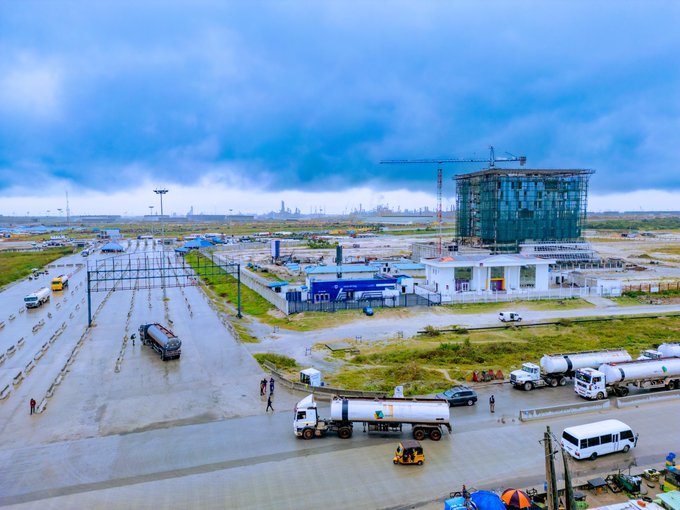The Independent Petroleum Marketers Association of Nigeria (IPMAN) has reassured Nigerians that there is enough fuel in the country and called for an end to panic buying.
In a statement made on Sunday in Abuja, Mr. Ukadike Chinedu, the IPMAN Publicity Secretary, urged Nigerians to remain calm as there is no fuel shortage.
Chinedu’s remarks come amid concerns about the possibility of fuel scarcity as the Yuletide season approaches.
He reassured Nigerians that fuel is available in the country’s supply chain, and there is no need to rush to filling stations.
“There is no cause for alarm,” Chinedu stated. “We have enough fuel to meet the demands of Nigerians. People should avoid panic buying.”
The Publicity Secretary also highlighted the reduction in the price of petrol by Dangote Petroleum Refinery as a positive step for the nation’s fuel sector.
In November, the Dangote Refinery had lowered its petrol price to N970 per litre, which was seen as a positive move for consumers. Recently, the price was further reduced to N899.50 per litre.
“This is good news for all Nigerians,” Chinedu said. “The reduction in fuel prices by Dangote Refinery is a welcome development. It will help reduce transportation costs for Nigerians, especially as we approach the Christmas holidays.”
The reduction of fuel prices is expected to bring relief to commuters who have been facing rising transport costs due to the fluctuating price of petrol.
Chinedu explained that the drop in petrol prices was a result of deregulation, where market forces determine prices.
“The beauty of deregulation is that prices are determined by market forces,” he said. “With both Dangote Refinery and the Federal Government refineries in operation, we expect competitive pricing that benefits Nigerians.”
The IPMAN Publicity Secretary also urged all independent petroleum marketers to adjust their pump prices to align with the new price.
“We have started ordering at the new price, and many of our members are already adjusting their pumps to reflect the lower prices,” he noted. “It’s important for marketers to follow this change because if your price is higher, people will simply go to the station with the lower price.”
He further explained that the reduced prices were already having a positive impact on queues at petrol stations.
“Already, the queues that you normally see at NNPC filling stations have reduced,” Chinedu said. “Many marketers are now selling at competitive prices, and this has helped in reducing congestion at the pumps.”
The reduction in fuel prices by Dangote Refinery and other refineries, along with the efforts of marketers to adjust their prices, is expected to ease the burden on Nigerians, especially as the Christmas season approaches.
Chinedu emphasised that the country’s fuel supply situation is stable and urged the public to refrain from hoarding or panic buying.
IPMAN’s statement also comes in the wake of concerns over potential fuel shortages due to rising demand during the holiday period.
However, with the drop in fuel prices and assurance from IPMAN, Nigerians can be confident that there will be no scarcity.
The Publicity Secretary’s call for calm is aimed at discouraging hoarding and long queues at filling stations.
“The fuel supply is steady, and marketers are doing their best to meet the demand,” he said. “We have enough stock in the country, and there’s no need for people to panic.”
Chinedu also encouraged Nigerians to report any filling stations that are hoarding fuel or overcharging customers.
“We urge Nigerians to report any station that is hoarding fuel or charging above the regulated price,” he said. “IPMAN is committed to ensuring fair pricing and availability of fuel across the country.”
The reduction in fuel prices has already been welcomed by many Nigerians, particularly commuters who rely on public transportation for their daily activities.
The price reduction by Dangote Refinery has been seen as a step in the right direction in addressing the challenges facing the Nigerian fuel sector.
“This is a good gesture by Dangote Refinery,” said a regular commuter in Lagos. “It will make a difference, especially for those of us who depend on public transport.”
The new fuel price will also have a positive impact on transport operators, who have been struggling with rising fuel costs.
“It’s a relief for us,” said a bus driver in Lagos. “The reduction in fuel prices will help us keep our fares stable and avoid overcharging passengers.”
The reduction in fuel prices comes at a time when Nigerians are grappling with inflation and the rising cost of living.
For many Nigerians, the cost of petrol is a significant part of their daily expenses. Therefore, the recent reduction in fuel prices is expected to have a positive impact on their financial situation.
With Christmas approaching, many Nigerians will benefit from the reduced fuel prices, as they travel to visit family members and friends across the country.
The price cut also comes at a time when there has been increased interest in the development of local refineries in Nigeria.
The Dangote Refinery, which is the largest in Africa, is expected to play a significant role in ensuring a stable supply of fuel in the country.
With the ongoing efforts by the Nigerian government and private sector to enhance fuel production and distribution, Nigerians can expect more stability in the fuel market in the coming months.
Chinedu urged the government to continue supporting the development of the country’s refineries and fuel infrastructure.
“The government should continue to support the development of local refineries,” he said. “This will ensure that Nigeria becomes self-sufficient in fuel production and reduce our reliance on imported petroleum products.”
The Federal Government has made efforts in recent years to increase local refining capacity, and with Dangote Refinery’s new price cuts, it appears that progress is being made in the sector.
As Nigeria continues to face challenges in its fuel sector, the commitment by IPMAN and Dangote Refinery to reduce prices and ensure the availability of fuel is a positive sign for the future of the country’s petroleum industry.

